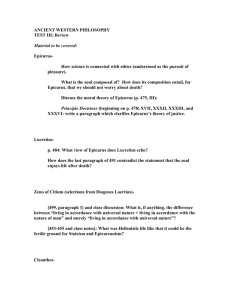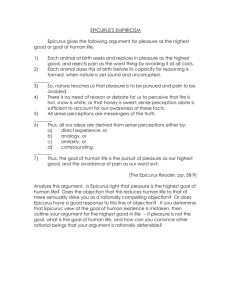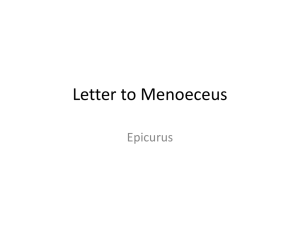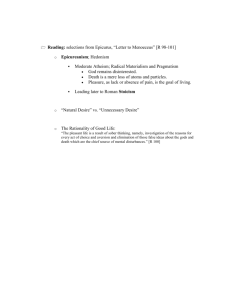Epicurus and Epictetus Clark Wolf Director of Bioethics Iowa State University
advertisement
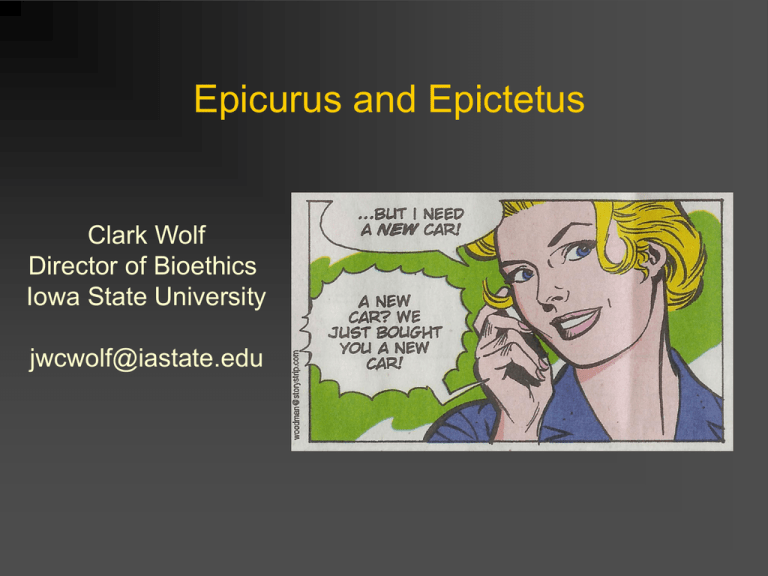
Epicurus and Epictetus Clark Wolf Director of Bioethics Iowa State University jwcwolf@iastate.edu Argument for Analysis: “What use is excess agricultural production if we just turn all our corn into soda pop and animal feed? People believe that Iowa farmers “feed the world,” but it’s just not true. Iowa crops almost entirely go to feed cattle sold for food in the US, and to make corn syrup used in soda pop. To “feed the world,” we’d need to be producing food that benefits people. But all nutritionists agree that Americans eat too much meat, so in the present context, growing livestock feed doesn’t provide nutritional benefits. And obviously soda pop doesn’t feed people.” Argument for Analysis: 1) Iowa crops almost entirely go to feed cattle sold for food in the US, and to make corn syrup used in soda pop. 2) To “feed the world,” we’d need to be producing food that benefits people. 3) But all nutritionists agree that Americans eat too much meat, so growing livestock feed doesn’t provide nutritional benefits. 4) soda pop doesn’t provide nutritional benefits. 5) Conclusion: Iowa farmers produce crops without nutritional benefits. (Implicit) 6) If Iowa farmers produce crops without nutritional benefits they’re not feeding the world. (implicit) 7) Conclusion: It’s not true that Iowa farmers feed the world. Argument for Analysis: 1) Iowa crops feed the world only if the provide nutritional benefits for their ultimate consumers. Iowa crops produce meat and soda pop for the US market. 2) Since there is overconsumption of meat in the US, producing more and cheaper meat doesn’t provide nutritional benefits. 3) Soda pop doesn’t provide nutritional benefits. 4) Iowa crops are not used to provide nutritional benefits for their ultimate consumers. 5) Therefore Iowa crops don’t feed the world. Argument for Analysis: In the end, it really doesn’t make sense to care about other people or to love others. If you can insure that the only things that you care about are within the command of your will, then no one can harm you or damage you or do anything bad to you. To love another person is to care about what that person does, and to care whether that person will love you back. But these are things you can’t control, and which are outside of the command of your will. Argument for Analysis: 1) If you can insure that the only things that you care about are within the command of your will, then no one can harm you or damage you or do anything bad to you. 2) To love another person is to care about what that person does, and to care whether that person will love you back. 3) But these are things you can’t control, and which are outside of the command of your will. 4) If caring about something renders you vulnerable to harm, then it doesn’t make sense to care about that thing. (Implicit?) 5) Conclusion: it doesn’t make sense to care about other people or to love others. Argument for Analysis: It doesn’t make sense to care about something if you can’t do anything about it. But the only things we can really control are our own attitudes and internal states. So we should only care about our internal states. Life, death, war, other people’s welfare,… none of these are internal states. So we shouldn’t care about any of these things. (After Epictetus) Announcement: This PPT file may change somewhat between now and Thursday Sept 27, which is the last class before your exam. The exam will be on Tuesday October 2. Epicurus: Epicurianism: In all things, we should pursue pleasure: the life that has in it the most pleasure is the best life for human beings. Opening of Letter to Menoeceus: Let No One Delay... [Compare to Plato & Aristotle...] Contrast Class: The Cyrenaics Aristippus- [435-350 BCE] Our lives should always be dedicated to the acquisition of as many pleasures, preferably as intense as possible, as we can possibly obtain. Even when intense pleasures lead to subsequent pain, they should still be sought, for a life without pleasure or pain would be unredeemingly boring. Pleasures are best obtained, he claimed, when one takes control of a situation and other people, and uses them to one's own advantage. [Cyrenaicism] The Stoics, including Epictetus, spread scandalous rumours about Epicurus: "This is the life of which you pronounce yourself so worthy: eating, drinking, copulating, evacuating, and snoring!" (Epictetus, Discourses) The truth is otherwise: Epicurus recommended a life of calm and enduring pleasures, not a life of many and varied intense pleasures. Epicurus was suspicious of intense pleasures in general, since he thought that many of them were 'unnatural' and led to later pains. Epicurus: Three Kinds of Desires 1) Natural desires that must be satisfied for one to have a pleasant life (ex: food and shelter). 2) Desires that, though natural, need not necessarily be satisfied for a pleastant life (including, he thought, the desire for sexual gratification). [ XXX]- even these we should try to expunge with reason. 3) Desires that are neither natural nor necessary to satisfy (desire for wealth or fame).[XXVI.] Epicurus' Instruction Manual for a Pleasant Life: 1) For a pleasant life, we should neglect the third class and focus on the first, though we may also satisfy our desires of the second kind, when doing so will not lead to discomfort or pain. 2) It is NEVER prudent to try to satisfy unnecessary and unnatural desires, because in the long run this will lead to disappointment, dissatisfaction, discomfort, and poor health. Still, "No pleasure is a bad thing in itself" [VIII] but only for the bad effects it may have. Epicurus' Instruction Manual for a Pleasant Life: Epicurians on Sex: Sex they found especially problematical. Epicurus writes: " Sexual intercourse has never done anyone any good, and one is lucky if one has not been harmed by it." This seems to imply that sex is in the THIRD category, but that is odd, because it is natural. Lucretius, a later Epicurian, argued that sex was OK as long as it was not done with passion. (!!??) Epicurus' Instruction Manual for a Pleasant Life: 3) "TAKE THE LONG VIEW" and PLAN CAREFULLY Epicurus focuses on the pleasant LIFE, so any pleasure or desire we are considering must be understood in the context of our whole lives. The duration of pleasures, he claimed, is more important than their intensity. [So mental pleasures are superior to physical pleasures]. [XVI] Wise person will not allow her life to be ruled by chance. Honor and Justice? PLEASURE AND HONOR IN EPICURUS: Honor and justice are independent goods, he seems to imply [V] but only those who lead a pleasant life can achieve it. What is the nature of honor and justice? Are they good in themselves? [Well, only pleasure is good...] Epicurus believes that they are INSTRUMENTALLY good, because dishonour and injustice are unpleasant, and lead to problems later. Like some current defenders of naive utilitarianism, Epicurus seems to have been undisturbed by this, since he seems to have thought that Honor and Pleasure never really come in conflict with one another. He doesn't explicitly consider what one would do in such cases, but his position forces him to conclude that pleasure should come first if conflict ever did arise. Alternate Conceptions of Pleasure: Positive v. Negative Conceptions of Pleasure: Epicurus' conception of pleasure is "negative," since he defines pleasure as the lack of pain and frustration. This could be contrasted with the Cyrenaic conception of pleasure as a good thing to be achieved, rather than successful avoidance of what is bad. EPICTETUS AND STOICISM: Three Stoics: Seneca (3 BC-65 AD), Roman Senator Epictetus, (50-60 to 100-130 AD) Slave Marcus Aurelius, (121-180 AD) Emperor virtue = good will = will that things happen as they are going to. Epictetus, Discourses, From “Of the Right Treatment of Tyrants" “When the tyrant says to anyone, "I will chain your leg," he who chiefly values his leg cries out for pity; he who chiefly values his own moral purpose says "If you imagine it for your interest, chain it." "What! Do you not care?" "No, I do not care." "I will show you that I am master.“ "You? How should you? Zeus has set me free. What! Do you think that he would suffer his own son to be enslaved? You are master of my carcass; take it.“ "So that when you come into my presence you pay no attention to me?“ "No, I pay attention only to myself; or if you will have me recognize you also, I will do it, but only as if you were a pot." INSTRUCTIONS FOR STOIC VICTORY: 1) (*12) maintain consistency in your judgments; be detached and impartial. 2) (*2) Control your desires and aversions. 3) (*28) Don't turn yourself over to 'bad masters' like passion, wrath, luxury. 4) (*3) Don't become attached to what is fragile, things whose fate is not up to you. (In all contexts? What of attachments to friends and family?) 5) (*15)"Don't stretch out your desires toward what is not in your control... 6) (*16) Don't let other people's troubles disturb you. ("Do not groan inwardly...") 7) The final stoic victory: (*19)"You can be invincible..." [Nota Bene: Guard against the wrong interpretation of this: Epictetus is not literally recommending that we should never enter races we can't win, but that we make sure that the only races we enter with full devotion and conviction are internal and controlable.] "You will be 'somebody' in all that matters..." EPICURUS AND EPICTETUS ON THE FEAR OF DEATH: Epicurus: "Death is nothing to us." (all good and bad is in sensation. No sensations after death. After death, nothing will be good or bad for us. "When we are here, death is not, and when death is here, we are not." 1) All good and bad is in sense experience. [Substantive claim.] 2) Death is the absence of sense experience. [Df.] 3) The absence of sense experience cannot be good or bad. (by 1) 4) Death can't be good or bad. 5) Death can't be bad. 6) We shouldn't fear something if it's not bad. 7) We shouldn't fear death. EPICURUS AND EPICTETUS ON THE FEAR OF DEATH: 1) Fear of death is equivalent to the desire to live forever. 2) One would desire to live forever only if one believed that length of life is what makes life good, such that longer lives are better than shorter lives. 3) But it is the content of a life, not its length, that makes it good or bad. [If it contains lots of pleasure, it's good; if lots of pain, it's bad.][this contradicts 2] 4) So long lives are not necessarily better than short ones. 5) So the desire to live forever is not rational. [Epicurus believes that recognition that this desire is irrational will help us to extinguish it.] 6) So the fear of death is not rational. Why premise 1? To fear death is to want not to die, and to want not to die is to want to live forever. EPICURUS AND EPICTETUS ON THE FEAR OF DEATH: 1) When we are here death is not; when death is here, we are not. 2) We'll never meet (encounter) death. 3) It is irrational to fear something you will never encounter. 4) It is irrational to fear death. EPICURUS AND EPICTETUS ON THE FEAR OF DEATH: Epictetus: Death is among the things we should be indifferent about. The wise person will keep her or his desires away from immortality, since it is not among the things that are up to us. Keep your desires away from immortality. To fear death is to allow yourself to indulge in an inappropriate aversion. Brace up and extinguish it! EPICURUS AND EPICTETUS: FINAL EVALUATION: Both Epicurus and Epictetus got something right. Epicurus: Taking the long view about one's life; avoidance of excess; happiness is a precondition of honor, justice, and virtue. Epictetus: Role of expectation; taking misfortune philosophically; focus on what we can do and do it; Honour- maintain your dignity and Honor at all cost. Even a slave can do this. Epicurus and Epictetus: Reservations: 1) Epicurus claims that pleasure is the only good- perhaps he should have read Aristotle more carefully- Aristotle is quite convincing in his argument that Pleasure is a good thing, but not to be bought at the expense of other goods. Epictetus recognized this error in Epicurus' view, and critisized him soundly for it. Aristotle's Test: Imagine a life full of good X (pleasure). If there is something one could add to X, to make life even better, then X is not The Master Good. [Pleasure Machine Example...] 2) Naturalistic move- According to Epicurus, it is natural for us to seek a pleasant life above all other things; It follows, he reasoned, that we ought to seek a pleasant life above all other things. In this, Epicurus was a NATURALIST in Ethics. But Just because it is natural for us to do something, it does not follow that it is what we OUGHT to do. Epicurus and Epictetus: Reservations: 3) Epictetus- focus on internal aspect of morality captures something very important, but perhaps this is not all there is to living the good life. Friendship, Love, true compassion, ... these things REQUIRE that we take risks. The very poor have nothing to risk (Epictetus, you will remember, was a slave...) but in order to live a fully human life, we may need more than Epictetus‘s inward virtue. Honor is important, as Epictetus recognized. But we can maintain our honor without avoiding attachment and passion and love. It's important to recognize that there is a part of morality that we can control entirely-- this is especially valuable in hard times. But as a complete picture of The Moral Life, Epictetus' account seems seriously lacking. QUESTIONS ON THE STUDY SHEET FOR THE FIRST IN CLASS EXAM? Exam: Definitions Argument analysis Plato, Aristotle, Epicurus, Epictetus
